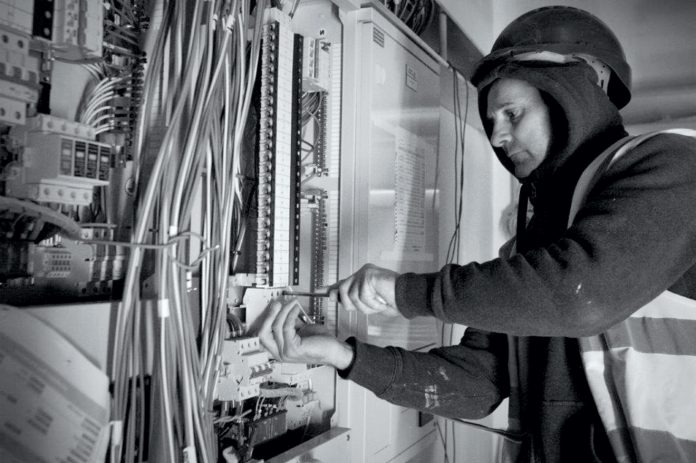Across the UK and Ireland, there is a litany of small, medium and large projects that have run into delay or experienced significant disruption due to endemic supply chain weaknesses in the construction industry – weaknesses that are often costly in terms of financial loss and reputational damage.
The input usually determines the outcome of any project, i.e., “You get out what you put in”. The acronym GIGO (Garbage In, Garbage Out) is used in the computer science world to remind programmers of the likely and negative impacts that flow from poorly conceived inputs. If we change the GIGO acronym to QIQO (Quality In, Quality Out) to dignify the position of people over IT programmes, then we can use the same concept for the construction industry.
Most responsible buyers accept the principle of QIQO, so it follows that greater attention should be given to determining the (electrical) competency and composition of a contractor’s direct and indirect workforce, before their input to the project.
WORKER COMPETENCY
One area that modern procurement of building services often fails to make adequate provision for is the specification and monitoring of individual worker competency. Given that most of the installation of containment, cables, plant, equipment, lights, and accessories are carried out by people, it seems remarkable that little is said about the precise occupational identity, definition, and competency of the appointed electrical subcontractor’s workforce. It is important to remember that evidence of ascertaining, monitoring and auditing individual and workforce competency on a project is essential to a good defence when things go wrong. Failure to determine, monitor and audit individual and workforce electrical competency is a long-standing blind spot for many construction industry clients.
This fault gives rise to unintended consequences on the client’s side, e.g., the use of underqualified workers impedes apprenticeship recruitment and increases the reliance on one or two go-to qualified workers. Quality of work, safety, functionality and whole life cost expectations are undermined when electrical QIQO principles are ignored or overlooked.
The construction industry does not presently serve responsible clients well in terms of being able to track and manage individual worker competency. The principal reason for the condition can be linked to the breakdown and absence of effective control and accountability measures on the industry’s side. Clients of the industry have traditionally been offered a system based on the presentation of a plastic card which often requires them to undertake an administratively burdensome, one person at a time, online checking procedure.
The UK and Irish Governments spend immense sums of public money on electrical installation work in healthcare, infrastructure and other departmental construction projects that, in many cases, are not carried out by qualified electrical workers. Some clients have become acclimatised to sponsoring the service of electrical sub-contractors on a trust basis in terms of individual worker competency. By doing so, clients are choosing to believe and accept that the workers of an appointed contractor’s workforce are appropriately qualified to carry out electrical work on their project. Some control is afforded by project and contract management procedures and use of the existing regularity control measures.
However, these resources often lack precision and tend to become an administrative box-ticking exercise when assessing and monitoring the electrical competency of a contractor’s workforce.
CLIENTS DESERVE BETTER
Too many unqualified, underqualified and self-designated electrical workers have entered the supply chain, breaking the traditional virtuous loop of industry apprenticeship training. Responsible clients of the construction industry need a modern, fit-for-purpose resource that helps them answer the big questions when it comes to a claim, investigation or public inquiry.
Qualified and competent workers are the UK and Irish electrical industry’s best asset. However, these workers are often displaced by parts of the industry that have become reliant on unregulated and extended labour supply chains. We think the industry should be responsible for the automatic, up-front, online disclosure of the occupational identity and electrical competency of project workers before and during the delivery of site activities.
The SparkSafe Licence to Practise system has been designed and is currently achieving these outcomes on one billion pounds plus worth of UK construction projects.
SparkSafe Licence to Practise
Registered Charity: NIC101034
T: (NI/RoI) 0044 (0)28 2566 6835
E: enquiries@sparksafeltp.co.uk
W: www.sparksafeltp.co.uk











